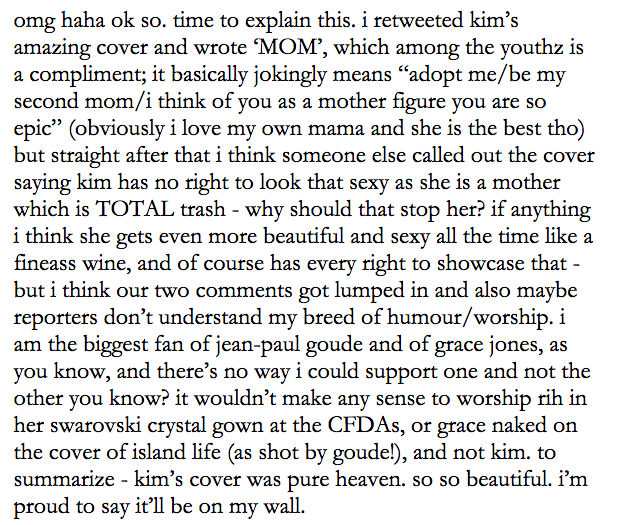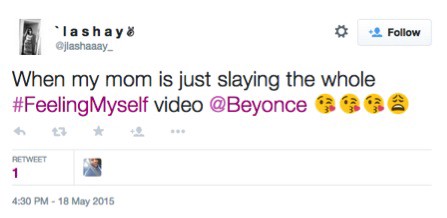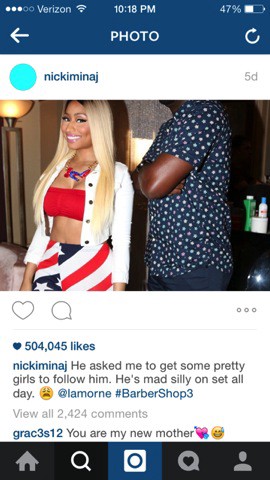Are You My MOM?
by Hazel Cills and Gabrielle Noone


You may have noticed the phenomena of young people referring to their favorite celebrities as “MOM” on social media. Today we’re going to explore the Oedipal connotations behind this trend and what it says about the sexual psyche of Internet-using adolescents.
LMAO SIKE! Ew, like, would we even?
Seriously, for starters, to call someone “MOM” (or Mom/Mother) on the Internet isn’t sexual. To be a “MOM” is way different from the very distant slang cousin, “MILF” (Mother I’d Like To Fuck), a phrase which most young people would probably agree is deeply uncool. “MILF” is sexual, as it its “DILF” counterpart, and it is rooted in porn-driven horny-boy fantasies where some naive teen boy pines for or gets it on with some older mother figure. Thanks, “Stacy’s Mom” and American Pie.
But “Mom” as slang and not just, you know, the nickname to refer to a parent, was most notably brought out of the dregs of teen Internet fandom and into the public eye when Lorde retweeted Kim Kardashian’s Paper magazine cover with the caption “mom.”
“@KimKardashian: #BreakTheInternet http://t.co/3RhAPqJkPn” mom
— Lorde (@lordemusic) November 12, 2014
Reporters misinterpreted Lorde’s commentary as a criticism of Kardashian for being a mother who chose to pose for a nude photoshoot. She took to Tumblr and summarized the “Mom” phenomenon properly:

“MOM” is a compliment along the lines of “QUEEN” or “SLAY,” but it’s something more than just “you look good!” It’s to say “Damn, you are so cool, you give the best advice and are super hot, I seriously just want you to be my mentor and/or have birthed me, for real.”
The difference between “MOM” and other compliments women — especially famous women — get is that “MOM” is ultimately about respect. In reality, Moms don’t get enough respect.
Previous versions of Mom culture, according to teens, were based on the idea that moms are universally uncool. Moms wear unflattering jeans (yet so-called “Mom jeans” are considered hot on skinny young women.) Their idea of a good time is, apparently, drinking pinot grigio at a book club meeting. But this idea that Moms are universally uncool is clearly not true because not all Moms wear the same jeans, ya feel? We can’t just apply blanket label to all of Mom culture with silly symbols like denim and wine preferences.
That’s why “MOM” as a powerful compliment is so important. Mom culture has not been praised the same way Dad culture has in the past few years. We make fun of Dads and their Dad jokes and their Dad outfits and their “Dad Bods,” but at the end of the day we’re laughing with a Dad and not at him. Dads can do the most mediocre, uncool shit and people will think it’s endearing. I mean, just think of the indie rock bands that have sprouted up in the past few years: Radical Dads, Drunk Dads, Dads! We get it.
Moms are constantly the butt of the joke, like the ever present “YOUR MOM” trope. You want to fuck a Mom, it’s a joke. You want to dress like a “Mom,” it’s ironic. No one says they’re being “such a Dad” when they warn their friends to put on their seatbelt or wear sunscreen or to text them to say they got home safe. Moms are concerned so they yell at you and remind you of the rules. Mom culture is clingy, disapproving, or weirdly sexualized. Dads get called “brave” just for showing up.

It’s not that Moms are “cool” or “hot” specifically. It’s that popular conceptions of what a mother should or shouldn’t be are constantly changing, and nothing signifies this more than the Internet’s obsession with “MOM.” Young people don’t really see motherhood as a blanket culture anymore; many of our most popular and adored celebrities are outspoken mothers. We’re living in an age where Beyonce sings about getting her Skittles licked right on the same record as a song about her daughter.
But “MOM” is also beyond motherhood. It’s about admiration; there’s a Mother Mary aspect about it. Celebrities are saints and we’re lighting novelty prayer candles with their faces on them. Kim Kardashian posting pictures of her at North’s baptism in Israel is peak “MOM.”
Some actual mothers have taken offense to motherhood being immediately equated with greatness. In New York Magazine, Lisa Miller wrote about hating the title:
‘Mom’ is an overpowering presence: omnipotent, mythic, nurturing, and bosomy, a perfumed provider of succor, discipline, and food; but also (as the child grows up) embarrassing, annoying, nagging, insufficient, disappointing — an object of fun.
Miller prefers to be called “Mother” and, as well, that people who aren’t her children refrain from calling her that at all. She is right that “Mom” carries a lot of symbolic baggage, as we’ve written above, and that it has this kid-specific aspect to its usage. But this “kids-eye view” Miller cites makes “MOM” so perfect: kids expressing intense affection for their favorite celebrities.

“MOM” ultimately comes from a place of admiration and fangirl-ism. Few people under the age of 21 are not a fangirl to some popular entity. Even alt-girls and art school kids seem to have their own interpretations of fandom rather than direct rejection of mainstream culture. There’s Etsy versions of merch and DIY zines devoted to the Kardashians or Beyonce or One Direction or Taylor Swift. And as fandoms grow bigger and more specific in Internet spheres like Tumblr and Twitter, pop stars, actresses, and Internet celebs keep getting elevated to different levels of greatness. “MOM” wouldn’t exist without extreme fandom and the constant stream of new pictures and tweets by your favorite celebs to comment on.
But “MOM” does have a weirdly personal connection tied to it. It rejects literalism in regards to motherhood, but retains the almost boring normalcy. I mean, how many of us have said that word? Fandom has become so normal that we’re using normal and pedestrian words to describe our appreciation; gone are Queens and Heroes and Inspirations. Whether you’re close to your mother or not, all humans have one. Our fandom is about joining as collective daughters and sons under one great celebrity.
Hazel Cills is a writer and witch living in New York City. She doesn’t trust a pizza slice she can’t fold.
Gabby Noone is a writer and student majoring in The Cheesecake Factory menu. She lives in New York.